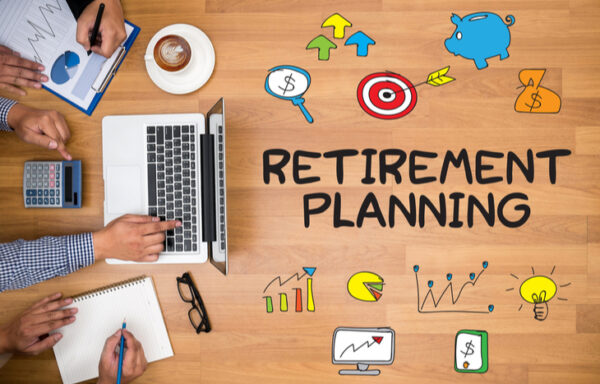5 Early Retirement Considerations
As you get ready to retire five, ten or more years earlier than the average, there are some early retirement considerations to beware of. The earlier you retire, the more barriers you’ll face when it comes to sustaining your income. There’s also healthcare to consider. It’s important to sit down and address some of these things before you decide to hang it up and enjoy retirement.
Here’s a look at five early retirement considerations and what they mean for you. Ask yourself these questions and be thorough in determining the answers. Diligent assessment of your situation will help you avoid some of the biggest headaches that early retirees tend to face.

Top 5 Early Retirement Considerations
1. Do You Have Reliable Income?
Retiring early means facing the hard prospect of waiting to tap into your retirement funds. You can’t take qualified distributions from your 401(k), 403(b), Traditional IRA or Roth IRA until you’re 59½. If you withdraw before then, you’ll end up paying a 10% fine. And, when it comes to Social Security, you’re not eligible until age 65.
The earlier you retire, the longer you’ll need to sustain yourself with income from non-qualified accounts. Unfortunately, this isn’t as simple as stashing hundreds of thousands of dollars in a savings account. Not only is this impractical, you’ll lose significant value to inflation.
The solution? Passive income. Build a strong dividend portfolio in your brokerage account and collect these payments as income. Or, invest in rental properties and create a cash-positive real estate portfolio. You can even get creative with your investments, such as an ownership stake in a profitable business. There’s also Substantially Equal Periodic Payments (SEPP) to consider. Whatever it is, just make sure you can sustain yourself until at least 59½.
2. How Are Your Assets Held?
As a general rule of thumb, your investment portfolio should move from aggressive to defensive the closer you get to retirement. You can afford to be aggressive in your 20s, when you have a long time horizon to capitalize on investments. Conversely, if you’re already retired, you can’t afford to take a big hit to your portfolio.
If you’re retiring early, make adjustments to your portfolio to protect your investments. You’ll still need to maintain some level of risk, since your retirement time horizon is longer. That said, it’s important to be safe and strategic.
Beyond the aggressiveness of your portfolio, consider your holdings themselves. For early retirees, property investments might be more liquid than funds tied up in a 401(k). You can sell a piece of property and use that income as-needed, whereas there might be penalties for early retirement fund withdrawals. Pay mind to how accessible your wealth is in early retirement.
3. What’s Your Emergency Plan?
Life is unpredictable and a lot can go wrong as the years march on. You need to have a contingency plan in place for emergencies that occur early into retirement. For example, if you need major surgery and are on a tight schedule due to a SEPP plan, what are you going to do?
Emergency planning is hypothetical… until it isn’t. Do your best to plan for worst-case scenarios (within reason). Simply having an emergency plan can help give you the peace of mind you need to enjoy early retirement. More important, it’ll ensure you’re covered in the event something does go wrong.
It’s often a smart idea to consider things like umbrella insurance or an increased home or vehicle insurance policy. These are costly assets to replace and repair, and costs can get even higher if there’s bodily harm involved. Safeguard yourself with insurance. That’s what it’s for!
4. How Will You Get Health Insurance?
Health insurance is its own can of worms for early retirees. Most policies run through employers, which means giving up yours when you cash in your retirement notice. If you have a spouse still working, you might be able to jump on their plan until you both qualify for Medicare at age 65. There are also private insurance plans to consider; however, they’re often expensive. Costs go even higher if you have special medical considerations like prescriptions or medical devices.
There is no simple solution to insurance. There are, however, a variety of options to explore. Find the one that offers the best cost-benefit to you. Often, it’s best to ride a good plan into Medicare and safeguard yourself against any major healthcare costs you might face up to age 65.
5. What Lifestyle Will You Lead?
Retiring early only makes sense if you’ve got the next phase of your life planned out. Ask yourself what you want to do when you no longer need to fill your days with work. Whatever it is, you need to make sure you can finance it. You also need to consider this in relation to your current lifestyle.
As a rule of thumb, your retirement income should match no less than 75% of your pre-retirement income. Ask yourself if this will cover your expectations for a retirement lifestyle. If not, make sure you’ve got enough socked away to cover as much as 80-90% of your pre-retirement income. Don’t forget to factor inflation!
Early Retirement Considerations And Beyond
Doing a temperature check on your early retirement plan is a great way to make sure you’re still on-track. And, taking these five simple early retirement considerations into account will keep you from running into unexpected trouble later on, when the time to retire actually comes.
To find your path to financial independence in retirement, sign up for the Wealthy Retirement e-letter below. You will find various investment opportunities and tips to generate passive income that will help you retire when you are ready.
The great thing about retiring early is that there are plenty of examples and case studies to draw from. Someone before you ran into the same problems you may face. See what they did to overcome them, and get yourself back on track to early retirement.





